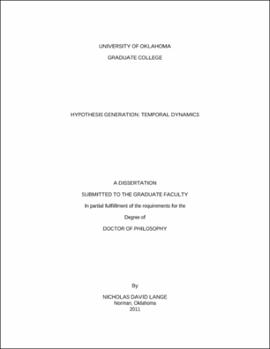| dc.contributor.advisor | Thomas, Rick P | |
| dc.creator | Lange, Nicholas David | |
| dc.date.accessioned | 2019-04-27T21:41:47Z | |
| dc.date.available | 2019-04-27T21:41:47Z | |
| dc.date.issued | 2011 | |
| dc.identifier | 9999497802042 | |
| dc.identifier.uri | https://hdl.handle.net/11244/319365 | |
| dc.description.abstract | In order to bring structure to many of the judgment and decision making problems people encounter, decision makers are often required to generate, from memory, hypotheses explaining their observations. This dissertation focuses on this predecisional process of hypothesis generation which underlies and supports much judgment and decision making behavior. Although we are beginning to understand a great deal about the mechanisms governing the generation and utilization of hypotheses (Thomas, R.P. et al. 2008) more work is needed to fully appreciate how these retrieval, judgment, and choice processes operate in real-world task environments. | |
| dc.description.abstract | The present research addresses temporal dynamics underlying hypothesis generation processes. As temporal dynamics are an inevitable precondition for information acquisition and utilization, a full understanding of hypothesis generation processes will remain speculative without systematic examination of the influences of such dynamics. Four experiments examined various pertinent issues in an effort to provide fundamental insights upon which more complete theory can be developed. The influence of information order, information activation in working memory, information agreement, information use (grouped vs. isolated), and working memory allocation were examined. Furthermore, two novel methodologies are forwarded providing unique approaches for assessing the active contents of working memory through time. By exploiting biases in which visual attention is drawn towards items matching the contents of working memory these measures are able to index the current contents of working memory at any given point in time. | |
| dc.description.abstract | Several critical findings emerged from this set of experiments. First, results indicate that people tend to weight later information more heavily than earlier information in some, but not all, circumstances. Second, the role of information activation in working memory was implicated as governing its contribution to the hypothesis generation processes wherein more active items contribute more. Third, it was found that the acquisition of information that is inconsistent with hypotheses under consideration causes people to discard these inconsistent hypotheses. This work provides important insights into how internal working memory dynamics interact with external dynamics in shaping the hypothesis generation process that can be used to support the development of a comprehensive computational theory. | |
| dc.format.extent | 148 pages | |
| dc.format.medium | application.pdf | |
| dc.language | en_US | |
| dc.relation.requires | Adobe Acrobat Reader | |
| dc.subject | Hypothesis | |
| dc.subject | Short-term memory | |
| dc.title | Hypothesis Generation: Temporal Dynamics | |
| dc.type | text | |
| dc.type | document | |
| dc.thesis.degree | Ph.D. | |
| ou.group | College of Arts and Sciences::Department of Psychology | |
